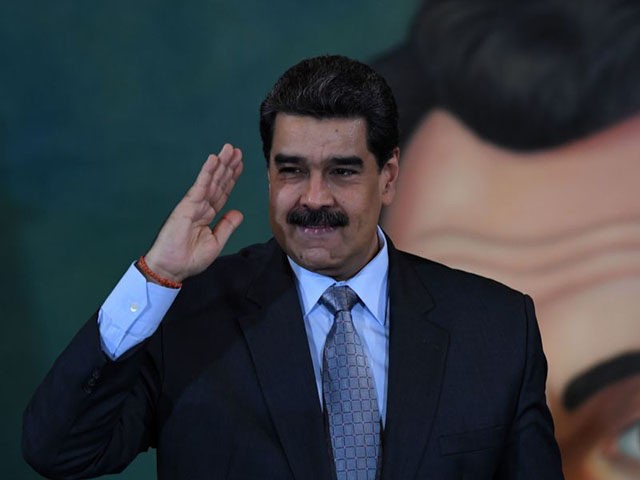Venezuelan socialist dictator Nicolás Maduro told the Washington Post in an interview this weekend that he could see a future of “dialogue” with President Donald Trump, over a year since he ceased being the legal head of state of his country and after months of increasingly harsh sanctions on his violent regime.
The Washington Post refers to Maduro as “president” despite the Venezuelan constitution saying otherwise; the nation’s legislature triggered constitutional provisions to remove him after his last legal term expired in January 2019. It also refuses to recognize the legitimate constitutional president of the country, Juan Guaidó, who it refers to as an “opposition” leader.
Interviewer Anthony Faiola described Maduro as “exuberant” and unquestioningly repeatedly denials from Maduro that he has close ties to both Marxist terrorist groups in Colombia like the Revolutionary Armed Forces of Colombia (FARC) and Iran’s Hezbollah terrorist proxy organization. Faiola noted that the interview was “his first with a major U.S. media outlet since the day last February he abruptly pulled the plug on a Univision taping and ejected its journalists from the country” without noting he also arrested the journalists and confiscated the interview.
Univisión managed to use sources to retrieve the confiscated video of the interview, in which Maduro alleges that New Yorkers “eat garbage” as much as the starved residents of Caracas do.
The Washington Post interview nonetheless revealed that U.S.-led international sanctions on Maduro appear to be working, enough for Maduro to request a chance at “dialogue” with Trump.
“If there’s respect between governments, no matter how big the United States is, and if there’s a dialogue, an exchange of truthful information, then be sure we can create a new type of relationship,” he told the Post. “A relationship of respect and dialogue brings a win-win situation. A confrontational relationship brings a lose-lose situation. That’s the formula.”
Maduro claimed that he “made repeated attempts to appeal directly to Trump” in the interview. Following Trump’s election in 2016, Maduro did use his monopoly on Venezuelan television to deliver messages to Trump, sometimes in English, urging Trump to support him. Maduro rapidly soured on the American president, however, insisting he take his “dirty hands” out of the country and accusing him, as he had former Vice President Joe Biden before him, of failed assassination plots.
Despite his talk of dialogue, Maduro rapidly returned to antagonizing the United States later in the interview.
“I don’t care even a little bit about what Europe does, or about what the U.S. does. We do not care at all. We only care about what we do,” Maduro said. No matter how many thousand sanctions, they won’t stop us, or Venezuela.”
Maduro also denied the extensive evidence of torture and murder against anti-socialist dissidents occurring since he took power in 2013, as he typically does.
Maduro has consistently relied on American mainstream media as a source of support in his tenure as dictator. He is a New York Times-published essayist and his regime has repeatedly published advertising in that newspaper to defend itself. In 2015, Maduro took out a full-page ad defending the violent expulsion of Colombian nationals from border towns, a repatriation that then-Colombian President Juan Manuel Santos compared to Nazi Germany. Two years later, the Times took another six-figure ad payment from the Maduro regime in which it claimed President Trump was preparing a military invasion of the country and urged Americans to unite with Maduro against Trump.
Maduro has threatened to kill American troops and periodically stages war games meant to intimidate the Pentagon. In response to both his belligerence and consistent evidence of rampant human rights abuses, the Trump administration has placed heavy sanctions on Caracas and, in recognition of the Venezuelan constitution, recognized Guaidó as Venezuela’s legitimate president. In the past year, this has meant Washington sanctioning Petróleos de Venezuela (PDVSA), the state-run oil company, and freezing the regime’s assets in America. In August, China reportedly stopped it would stop importing Venezuelan oil as a result of Washington’s sanctions.
In another expression of support for the anti-Maduro movement, U.S. Secretary of State Mike Pompeo scheduled a meeting with President Guaidó on Monday, who traveled to Colombia to deepen ties with regional allies. Most Latin American states recognize Guaidó as president; communist states Cuba and Nicaragua do not.
“I look forward to having a meeting with him,” Pompeo told reporters on a flight from Germany to Colombia. “Maduro has been destructive … Our mission set is to deliver a set of free and fair elections to the Venezuelan people.”
Speaking on Monday at the Opening Plenary of the Third Western Hemisphere Counterterrorism Ministerial, the event Guaidó traveled to attend, Pompeo thanked allies of Guaidó’s and noted Venezuela’s ties to Iranian terrorist proxies.
“We all know, too, that the Iranian regime’s top terrorist proxy, Hizballah, has found a home in Venezuela under Maduro. This is unacceptable,” he said. “Since last we met, the United States has done our part to take down the threat of Iran’s proxies. We eliminated Qasem Soleimani, and we strengthened our maximum pressure campaign of economic sanctions, diplomatic isolation, and strategic deterrence. The United States is encouraged to see how other nations have also confronted Hizballah and other terror groups.”

COMMENTS
Please let us know if you're having issues with commenting.